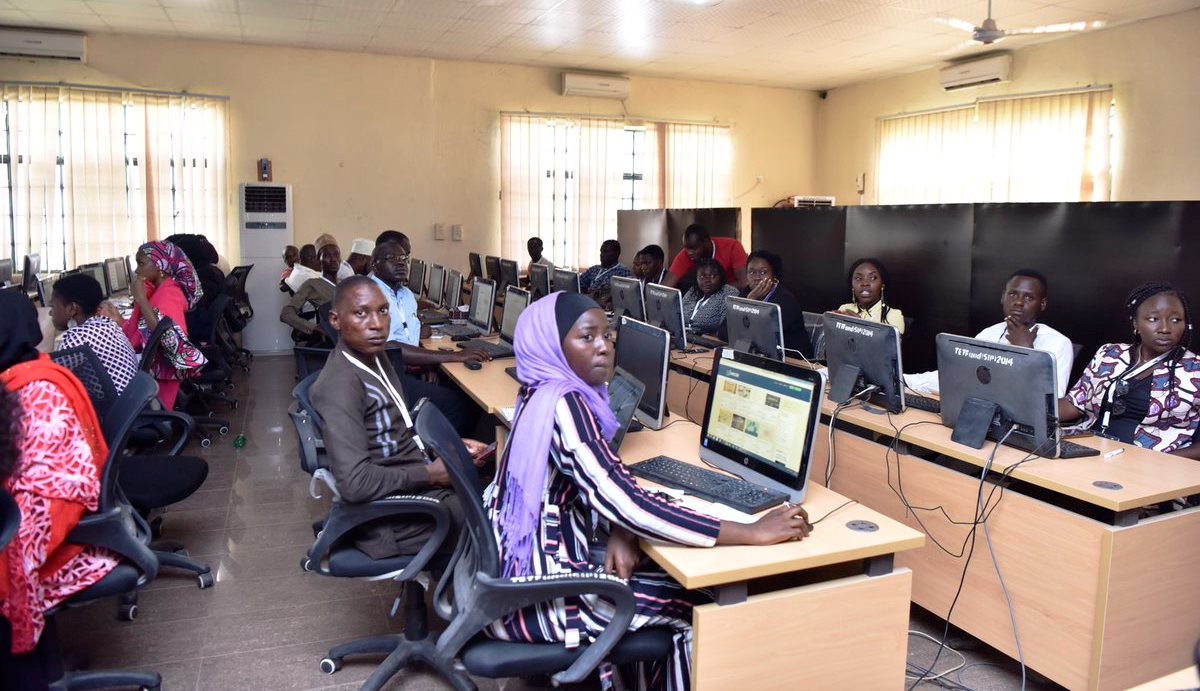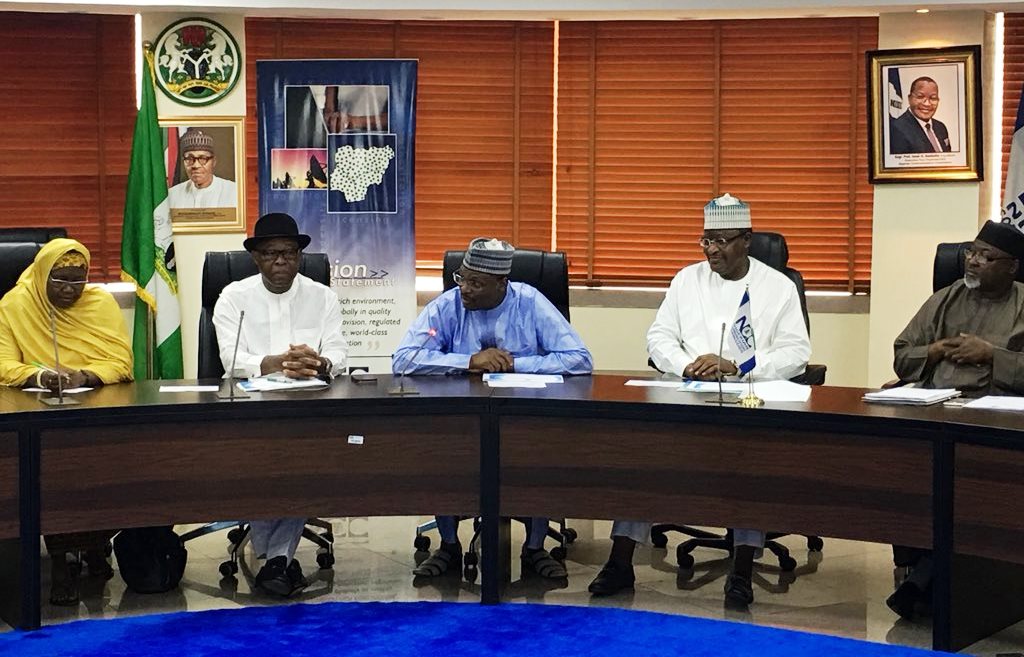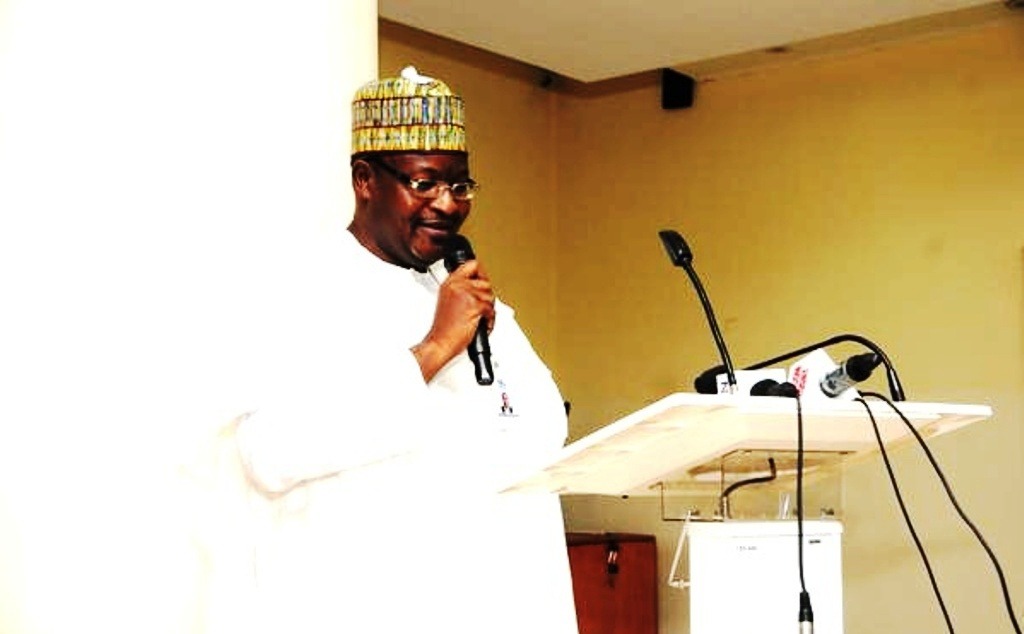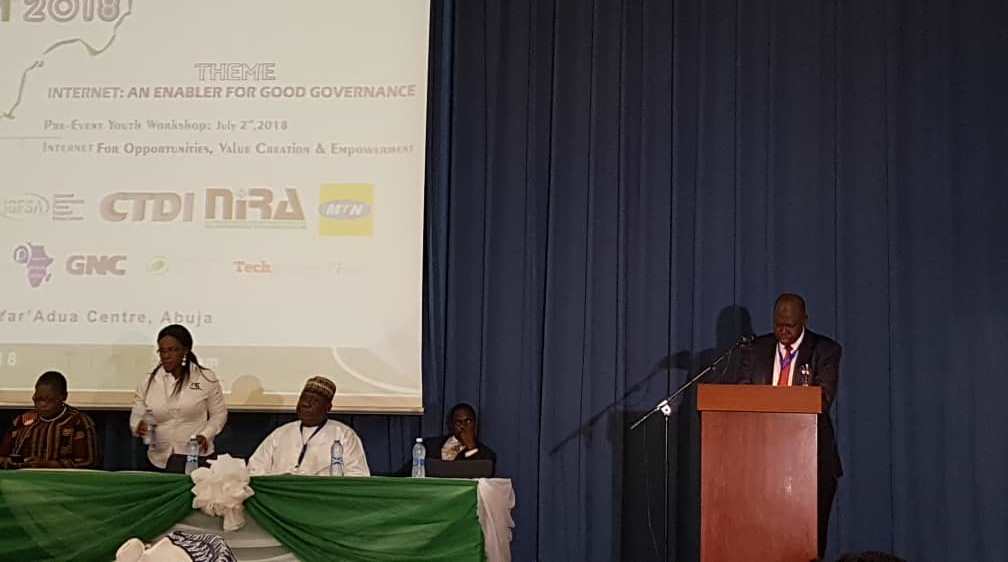The Nigerian Communications Commission (NCC) on Wednesday called for the cooperation and contributions of the judiciary to checkmate rising cases of cybercrime in the country.
The Executive Vice Chairman of NCC, Prof. Umar Danbatta, made the plea in Lagos during the “2018 Annual Workshop for Judges on Legal Issues in Telecommunication’’.
He said that in spite of the country’s positive achievements in digitalisation, the country was still facing issues concerning cyber security, information and data protection.
Danbatta was represented by Mr Clem Baiye, a Board Member of NCC.
“Cyber criminals have continued to develop new strategies to circumvent cyber security, regardless of measures put in place to checkmate their acts.
“It is necessary to discuss the admissibility of electronic evidence toward the successful prosecution of such cyber criminals.
“As such, the commission recognises the need for the judicial system to be part of those making contributions to checkmate the issue of cybercrime.
“Hence, the bold step behind exposing our judges to issues in telecommunication, ‘’he said.
According to him, digitalisation has changed our lives more than any other technical revolution because it has affected our means of communication, fundamental rights and privacy.
Danbatta said that the increase in cybercrime might be due to the proliferation of the internet and the decreasing cost of technology, which had provided millions of users the access to enormous resources.
He said that the workshop was also meant to discuss Artificial Intelligence (AI), a tool that enabled people to rethink how they integrate information, analyse data and use the resulting insights to improve decision-making.
Danbatta said that the commission would demonstrate how AI was already altering the world and raising important questions for the society, the economy and how it had affected the courts in speeding up decision-making.
Tag: Umar Danbatta
-
NCC, Judiciary, to jointly fight cybercrime
-

Why right policies are need to fast-track digital growth in Africa
Prof. Umar Danbatta, Executive Vice Chairman, Nigerian Communications Commission (NCC), has called on stakeholders in the telecommunication sector to put in place right polices to fast track digital growth in Africa.
Danbatta made this call on Monday at the International Telecommunication Union (ITU) and the Digital Bridge Institute Regional Human Capacity Building Workshop in Abuja.
The three days’ workshop has the theme: “Strengthen Capacity on Internet Governance in Africa.
He said there was need to put in place policies and institutions that will accelerate digital growth in the Africa continent.
“ We need to also examine policies that are in place and change those policies that pertain to internet governance with a view to making them more impactful.
“Policies that we need to put in place to inform internet governance, we need to look at what we can do to fast track blocking of internet access gaps.
“Because unless and until we do so, many of our citizens will continue to live without access to the internet, especially the right kind of internet connectivity, ‘the high speed internet, which is mostly facilitated by broadband infrastructure.
“NCC know how important it is to ensure that network is available, the infrastructure necessary to facilitate access to internet and that is why the country is being divided into seven zones with a licensee each to deploy broadband infrastructure,‘’ he said.
Danbatta said NCC through the Digital Bridge Institute (DBI) funds intervention aimed to provide training particularly to teachers in Nigeria tertiary institutions so that they can leverage the power of ICT to improve content delivery.
He said the training would also enable the teachers to access all relevant materials from the internet.
The NCC boss urged delegates at the workshop to make important suggestions on what can be done to bring about enabling policies and institutions that can transform the entire country as well as the Africa continent digitally.
On his part, Mr Marcelino Tayob, Representative of ITU Regional Office for Africa said the workshop which is an annual event of ITU regional office has the objective of providing a platform to share experiences and interact.
Tayob said the workshop dwells on matter selected for the theme of the year.
He said the annual workshop allows human resource professionals to meet under the guidance of the ITU to discuss and share views.
For 2018, we decided to combine the annual workshop on human capacity building and internet governance training.
“The ITU member states believe that capacity building of ITU members on internet governance is one of priorities to be addressed at this workshop with focus on at least developing countries,‘’ he said.
Earlier in his welcome address, Dr. Ikechukwu Adinde, Administrator DBI, said the workshop was aimed at discussing African concerns about human capacity building.
He said ITU member states have another opportunity to focus discussion on future of skills and knowledge as we seek to change the African Landscape in the digital economy.
“We must take strategy decisions that are implementable during the shortest possible time.
“Africa is endowed with talented and vibrant youth population but high population of them lack the skills and opportunity to participate meaningfully in growing the economy.
“In this context, digital skills is required to become genuine contributors in the present competitive market place, ‘’ Adinde said.
-

NCC, INEC review committee report on 2019 election
Nigerian Communications Commission (NCC) and Independent Electoral Commission (INEC) have met to review the outcome of the report of the joint committee set up early in the year on electronic transmission and collation of results.
Prof. Umar Danbatta, Executive Vice-Chairman, NCC, after the meeting with the INEC Chairman, Prof. Mahmood Yakubu, on Thursday, described the forum “as a huge step toward entrenching free, fair and credible elections in the country’’.
He said the joint committee set up seven months ago by the two agencies had worked hard to produce a document on the basis of which elections could be conducted in a manner conducive, credible and transparent.
“This can only be done by leveraging the power of Information Communications Technology.
“ So this is to bring to bear global best practices in the way and manner elections are being conducted all over the world,” he said.
On his part, the INEC chairman expressed delight with the way NCC picked up the gauntlet thrown by the INEC and the joint committee.
“When we started we were clear in our minds that we must challenge every national institution to contribute towards free, fair and credible elections in Nigeria.
“We are happy that the NCC has risen to this challenge and we look forward to implementing these recommendations.
“If there are other areas we need your collaborations we hope you will remain open to us to do so.
“But we are very happy that one major national institution has been challenged and has risen to the challenge,” he said.
In January, NCC and INEC, in a deal acclaimed to “have the potential of playing a major role in the outcome of future elections in the country reached an agreement on the electronic transmission of results in the 2019 general elections’’.
The meeting had in attendance Mr Ubale Maska , Executive Commissioner Technical Services (EC-TS) of NCC, , national commissioners of INEC and senior managers of the two agencies.
-
NCC to license telecoms operators to host lotteries on networks
The Nigerian Communications Commission (NCC) says it will soon license telecom companies to host lotteries on their networks.
Prof. Umar Danbatta, Executive Vice Chairman of NCC, said this during the review of the Memorandum of Understanding (MoU) between NCC and National Lottery Regulatory Commission (NLRC) on Monday in Abuja.
“Very soon we are going to license our telecomunicators to host lotteries on telecom networks and because the network are regulated by the NCC, we need to be involved.
“That is why the NCC has to be involved from the very beginning to ensure that our operators who will be participating in hosting the lottery services have the capacity to do so.
“The service you are about to introduce will add additional burden to the network and the NCC is always concerned that any burden on the telecommunication’s infrastructure may conspire to degrade quality of service.
“We are very much concerned that this does not happen. Our operators that will be participating in your lotteries have the capacity to host this additional very important service because of the empowerment it will be bringing in the country.
“What you are doing rhymes in two places of the eight-point agenda of the NCC in the area of strategic collaboration and partnership with other agencies of government and in the area of protecting and empowering the consumer,” he said.
Danbatta said the hosting of the lottery in the telecom network would empower the Nigerian telecommunication service consumers who may be among the many that would participate in the lottery.
He said NLRC and NCC have an existing Memorandum of Understanding since 2011 which was due for review every four years.
“The whole idea is to cooperate in order to provide the environment with facilities so to speak for the lottery commission to host lotteries in the country and because lotteries all over the world are electronically driven,’’ he said.
Earlier, the Director-General of NLRC, Mr Lanre Gbajabiamila, said the signing of the MoU between the two commissions would regulate telecommunications aspect of lottery in Nigeria.
“We had committees set up and worked together with NCC to make sure that everything is in place.
“We have also met with the operators to have a better understanding and to let them know the dos and don’ts of what we need to have in place.
“ I believe with this it will be easy for all the stakeholders involved to have the ease of doing business especially when it comes to lottery and gaming industry.
-

NCC to open up, assign other spectrum bands to telcos
The Nigeria Communication Commission (NCC) has said, given that spectrum is a critical mobile infrastructure, it will open up and assign other spectrum bands for telecoms service providers in the country.
NCC’s Executive Vice Chairman, Professor Umar Danbatta, made this known, while also stressing that the Commission will open up and assign the other spectrum bands in an open and transparent manner.
TheNewsGuru had earlier in a feature urged the telecoms regulatory commission of a greater need to tread with caution in order to avoid monopoly with the Visafone spectrum transfer to MTN Nigeria.
This is given that the MTN/Visafone spectrum transfer has raised issues among telcos operators in the country.
ALSO READ || Telecoms: NCC must avoid monopoly with Visafone spectrum transfer
TheNewsGuru reports reports that 2.3GHz spectrum has been licensed for wholesale wireless last mile services.
According to Danbatta, there are ongoing discussions with various levels of government to facilitate speed in processing permits, harmonisation of tax regimes and to ease the deployment of infrastructure, including streamlining right of way charges.
He said that there were also limitations and access gaps in metro fibre deployment to nodes, neighbourhoods and last mile connection to homes and businesses, which the government needed to address.
“Since spectrum is a critical mobile infrastructure, the commission will strive to provide the required frequency spectrum capacity.
“The commission will facilitate the re-farming of existing spectrum held by operators to provide broadband services without impacting their quality of service delivery.
“We will open up and assign other spectrum bands in an open and transparent manner,” he said.
According to Danbatta, the availability of broadband infrastructure will unlock new opportunities and drive a second wave of growth in the telecoms industry and the economy.
Meanwhile, speaking at ICT Watch Network Award Ceremony held on Friday in Lagos, Danbatta stated that broadband access is an important feature in communications infrastructure policy and should be treated as a key economic indicator.
According to him, broadband deployment has a strong impact on GDP, employment and productivity in all economic sectors.
“It can be seen all over the world that there is a higher economic growth in countries with more broadband penetration than countries with less broadband penetration.
“Hence, governments and regulators worldwide are strongly in support and make every effort in promoting broadband deployment, in order to stimulate the development of the economy and the society.
“The International Telecommunication Union (ITU) advocates that Broadband should be treated as an essential service like electricity and water, it is difficult to imagine life without water or electricity,” he said.
Danbatta assured that the commission would continue to drive and support high speed broadband connectivity to end users through various initiatives.
He said that initiatives such as licensing of InfraCos, on a regional basis, provide metropolitan fibre and wholesale transmission services on a non-discriminatory, open access and price regulated basis.
The Executive Vice Chairman said the roadmap was to have fibre point of access in every Local Government Area in in the country within four years of the commencement of deployments in each geopolitical zone.
-
NCC establishes monitoring committee
The Nigerian Communications Commission (NCC) says it has established Broadband Implementation Committee to fast track the deployment of infrastructure to raise broadband penetration in the country.
Prof. Umar Danbatta, the Executive Vice Chairman of NCC made this disclosure at the commission’s stakeholders’engagement meeting with relevant state agencies in charge of telecommunications matters.
The meeting’s theme is: “Optimising the Benefits of Telecoms Infrastructure in Nigeria’’.
Danbatta said that the committee would ensure targeted deployment of infrastructure needed to raise broadband penetration to 30 per cent before the end of 2018 would be met.
“The license has gone out to the Infrastructure Companies (INFRACOs), and we have a total of six of them in all zones of the country.
“And each zone has infrastructure company licensed by NCC to deploy infrastructure in that zone and no licensee is allowed to deploy infrastructure in any other zone because it will develop issues.
“On top of all these efforts, there is a subsidy NCC intends to pay, this subsidy will be paid to INFRACO licensee for attainment of milestone.
“The monitoring committee will confirm the milestone, verify that it had been attained and this subsidy will be paid,’’ he said.
Danbatta said that the NCC was eager to support states in driving universal access to citizens in the remotest parts to universal affordability, accessibility and availability of service throughout the country.
“This is a critical component of NCC’s Strategic Management Plan and 8-point Agenda,’’ he said.
He said that NCC was keen to enable states maximise the benefits of broadband infrastructure and digital platforms to drive growth, create employment and improve socio-economic interactions.
“In this regard, we are encouraging our licensees to explore opportunities for bilateral arrangements with your states.
“We urge you to take advantage of these opportunities and launch your respective states into the digital age,’’ Danbatta said.
Mr Sunday Dare, the Commissioner, Stakeholders Management of NCC said that over the years as telecoms infrastructure were becoming more ubiquitous, NCC licensees found it more and more difficult to meet prescribed rollout and quality of service benchmarks.
Dare said that NCC carefully studied the issues and realised that the national network was not functioning at optimal levels due to a number of factors such as frequent interruptions, security of infrastructure, power issues, high cost of approvals and slow permitting processes.
“We therefore enveloped an engagement template to deal with those factors that were understandably not within the control of the operators.
“We approached the governors of the 36 states of the federation and the FCT through the National Economic Council for their assistance.
“And in 2013, they agreed on basic principles to create a more enabling environment for the speedy deployment of new telecoms infrastructure and seamless operation of existing ones.
“The 2013 framework is now being reviewed to address obvious gaps and to accommodate new developments, especially to achieve deeper broadband penetration and more efficient services.
“We could just have limited our engagement to the governors. However, NCC strongly believes in applying well-tested approach of consultative regulation to our other endeavours, which is why we consider it critical to discuss with you.
“This forum is therefore very critical to the development of our dear country and that is why it is centered on the theme of “Optimising the Benefits of Telecoms Infrastructure in Nigeria”.
The meeting had in attendance representatives from over 26 states of the federation and FCT, amongst other stakeholders.
-

Withdrawn telephone lines: No time to allow waste – Danbatta
The Executive Vice Chairman of the Nigerian Communications Commission (NCC), Umar Danbatta, has said telephone lines withdrawn from telecom operators, is to allow for good management of resources.
TheNewsGuru reports 36.6 million telephone lines were withdrawn from some telecommunications operators from the National Numbering Plan (NNP) by NCC in March this year.
The NCC boss explained that the telephone lines were found to be redundant.
“Those are lines that are redundant. We always give statistics about active lines. We have noticed that the teledensity growing, steadily growing for six to seven months and has exceeded 150 million mark.
“It is expected of NCC that resources that are not being put into use were withdrawn so that this can in turn be a sign to all operators so that they can put them in good use and activate them.
“These are redundant lines that were withdrawn and if something is redundant, it means they are not being put to use.
“We do not have time to allow resources to waste. The intention is to ensure that all resources at our disposal, number resources and spectrum resources, are put into good use and to the benefit of this country,” Danbatta said.
The Commission said active mobile telephone lines in the country in lieu of the withdrawn 36.6 million telephone lines increased to 162 million.
It stated that mobile lines figure was as at the end of May, adding that it rose from 160 million recorded in April.
With 162, 075,116 lines in May and 160, 081,051 in April, the increase in the number of lines was 1,994,065.
However, the Code Division Multiple Access (CDMA) for active mobile lines had 217,566 users in May, same as in April.
In a report, NCC said that the number of fixed wired/wireless for active mobile lines in May was 137, 010 compared to April, which had 136, 496 lines, indicating an increase of 514 lines.
According to NCC, the number of Voice-Over Internet Protocol (VOIP) was 93,080 in May compared with 89,477 recorded in April, representing a rise of 3,603.
It also revealed that Teledensity rose by 143 in May to 11,609 as against 11,466 in April.
TheNewsGuru reports teledensity is the number of telephone connections for every 100 individuals living within an area and it varies widely across the country.
NCC also said that the number of connected mobile lines in May increased to 240,259,751 from 238,032,318 in April, recording an increase of 2, 227,433.
“The CDMA for connected lines for May was 3,586,095, the same figure with April,’’ the subscribers’ data revealed.
The report said the number of fixed wired/wireless for connected lines in May was 345,210 compared to April that had 344, 892, an increase of 318 lines.
It also showed that the number of VOIP for connected lines in May was 611,376 as against 575,712 in April, rising by 35,644 lines.
-

NCC says Internet users reaches 103m in May
Prof. Umar Danbatta, the Executive Vice Chairman, Nigerian Communications Commission (NCC) on Tuesday described the growth of the internet as enormous with the number of users reaching 103 million in May.
Danbatta, who was represented by Mr Haru Alhassan, the Director, New Media and Information Security of NCC, said this in Abuja at the Nigeria Internet Governance Forum (NIGF) 2018.
The forum’s theme is: “Internet: An Enabler for Good Governance’’.
He said that this was an impressive growth from 28 million internet users recorded in 2012.
“This evolution shows the importance of harnessing the benefit of internet for good governance.
“This figure of the internet subscribers’ data highlights the importance and the value of internet,’’ he said
Danbatta said that the commission would also license three additional Infrastructure Company (INFRACOs), bringing the number to seven to boost broadband penetration in the country.
He said the three INFRACOs were awaiting approval as the commission had earlier licensed two infrastructure companies earlier in the year to lay the foundation for internet penetration and increased broadband services.
The two INFRACOs are Zinox Technology Ltd. for Southeast and Brinks Integrated Solutions Ltd. for Northeast.
“The licenses are based on NCC open licensed model which is in line with the National Broadband plan 2013 to 2018,’’ he said.
Over a year ago, Mainone Cable company had been licensed to provide services in Lagos, while HIS got its license to cover the North Central Geopolitical Zone including Abuja.
“This event is very important in bringing various stakeholders to discuss issues of internet governance, ‘’ Danbatta said.
Prof. Muhammad Mainnima, the Vice Chancellor of Nasarawa State University Keffi said the theme of forum was apt and worthy of participation as Nigeria was approaching the 2019 general elections.
Mainnima, represented by Prof. Grace Pennap, the Deputy Vice Chancellor of the university said Information Communication Technology (ICT) would have significant role to play in the elections.
“While we agree that internet can promote good governance, it is important to think of how to make Nigeria cyberspace safe and secured.
“Therefore, it is my sincere hope that this year’s conference will add value positively to the narratives of good governance powered by the internet,’’ he said.
Earlier, Mrs Mary Uduma, the Chair, NIGF Multi-Stakeholders Advisory Group said NIGF was the local initiative of the UN Internet Governance that was agreed on by the world in 2005.
According to Uduma, NGIF is a stakeholders platform that discuss public policy issues pertaining to internet such as internet security, good governance.
“We have brought internet experts to dissect this along the line of global discussion in areas of access inclusiveness and diversity, cyber security and trust.
-
NCC to introduce new framework on infrastructure sharing, co-location
The Nigerian Communications Commission (NCC) says it will introduce a more active infrastructure sharing and co-location framework to help the small telecom operators provide service to all Nigerians.
Prof. Umar Danbatta, the Executive Vice Chairman of NCC said this on Tuesday in Abuja while fielding questions from newsmen.
Telecommunications operators had recently called on the NCC to look into the indebtedness of smaller telecom operators and support them to survive competition.
Mr Gbenga Adebayo, Chairman, Association of Telecommunications Operators of Nigeria (ALTON), made the call at a telecom stakeholders’ forum recently in Lagos.
Adebayo had said that reports and studies showed that big telecom operators survive more than small ones, urging NCC to help small operators survive competition from the bigger ones.
Danbatta said that NCC has frameworks for infrastructure sharing and co-location at the moment to ensure that companies without the capacity to deploy their own infrastructure could pay and get a lease of infrastructure from the bigger ones.
“Of recent, we are going to introduce another framework on active infrastructure sharing and co-location, meaning we are raising the bait.
“In all our regulatory framework, you will discover we have palliatives for smaller telecom operators and those with about seven and a half per cent of the market share are given consideration in asymmetric regulations.
“Asymmetric in the sense that we enforce on the bigger operators and we relax on the small ones,’’ he said.
According to him, the asymmetry is a common characteristic of NCC regulations with the intention to protect the smaller operators.
He said the regulation was to avail smaller operators a level playing field to play in a market dominated by the bigger operators.
“The small operators are equally cared for and they are given the chance to provide services for Nigerians.
“This is in order to ensure neutrality in the way and manner Nigerians subscribe to services, ‘’ he added.
-
National roaming will end rural-urban digital divide – NCC
The Nigerian Communications Commission (NCC), on Wednesday said that national roaming and active Infrastructure Sharing in Nigeria would end rural-urban digital divide.
The NCC Executive Vice-Chairman, Prof. Umar Danbatta, made this known at a stakeholders’ forum on “Development of Framework for National Roaming and Active Infrastructure Sharing in Nigeria’’ held at Digital Bridge Institute, Lagos.
Danbatta, represented by the Director, Spectrum Administration, Engr. Austin Nwaulunne said that national roaming had the potential of promoting seamless communication of subscribers.
According to him, subscribers will be able to roam on the network of other service providers where their own service provider is unavailable or has limited network coverage.
“The benefits of encouraging active infrastructure sharing can also not be over emphasised.
“Not only will there be noticeable reduction in network deployment costs, the industry will also witness acceleration in the take-up of broadband services and gradual elimination of the rural-urban digital divide.’’
Danbatta said that NCC was committed toward ensuring the continued growth and development of the telecoms industry.
He said the industry in 2017 inaugurated an Industry Working Committee (IWC) to work out the procedure and modalities for implementing National Roaming and Active Infrastructure Sharing.
“The past few years have seen the trajectory of the global telecommunications industry shift toward the implementation of cost-saving mechanisms which facilitate the effective utilisation of network resources for the provision of telecommunications services.
“National Roaming and Active Infrastructure Sharing are two of such initiatives which have been successfully utilised to achieve improved coverage, cost reduction and the efficient utilisation of scarce network resources by regulatory agencies.
“To ensure that these benefits are realised, pertinent issues such as quality of service, mobile number portability, issues of fair competition, billing and reconciliation, appropriate roaming agreements, extent of regulation required the need to continue to incentivise operators.
“To rollout infrastructure in under populated areas which were also considered in the articulation of the framework,’’ he said.